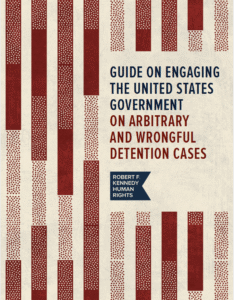(January 23, 2020 | Washington, D.C.) Robert F. Kennedy Human Rights welcomes a historic decision by the International Court of Justice (ICJ), which, for the first time, orders Myanmar to protect the Rohingya people from genocide. The order for provisional measures recognized the “real and imminent risk” the Rohingya faced in the aftermath of 2017’s widespread genocidal attacks by the Myanmar military and security forces. In addition, the ICJ order requires Myanmar to “take all measures within its power” to prevent future genocidal acts against the Rohingya.
“This landmark decision offers the first real measure of accountability and justice for Rohingya victims and survivors of the genocide,” said Kerry Kennedy, president of Robert F. Kennedy Human Rights. “As we mark the 75th anniversary of the liberation of Auschwitz this week, today’s decision by the ICJ reaffirms the global commitment to never again turn a blind eye to atrocities. We applaud the ICJ for taking this action to protect the estimated 600,000 Rohingya who are still living in Myanmar and remain at serious risk of genocide.”
The ICJ’s unanimous decision, by 17 judges, provides critical protections to the Rohingya people and outlines specific, binding provisional measures that Myanmar must follow. Firstly, Myanmar must “take all measures within its power to prevent” the commission of acts prohibited by the Convention on the Prevention and Punishment of the Crime of Genocide (Genocide Convention) against the Rohingya people. Secondly, it must ensure its military and other armed groups do not commit, incite, or attempt or conspire to commit genocide. As future proceedings will determine if previous attacks on the Rohingya violated the Genocide Convention, Myanmar must still protect and preserve any evidence of such past acts of genocide. Finally, the ICJ ordered Myanmar to submit regular reports on the steps it is taking to comply with the order for provisional measures.
To reach this decision, the ICJ relied partly on the U.N.’s Independent International Fact-Finding Mission on Myanmar’s September 2018 report, which found that the Rohingya had been subjected to numerous acts that are hallmarks of genocide, which include “the systematic stripping of human rights, the dehumanizing narratives and rhetoric, the methodical planning, mass killing, mass displacement, mass fear, overwhelming levels of brutality, combined with the physical destruction of the home of the targeted population, in every sense and on every level.” The report documents how, in widespread and systematic “clearance operations,” the Myanmar military and security forces were responsible for killing more than 10,000 Rohingya civilians, raping countless women and girls, destroying at least 392 villages, and forcing an estimated 725,000 people to flee to Bangladesh.
Today’s ruling follows Gambia’s decision to institute proceedings against Myanmar before the ICJ in November 2019 for violating the Genocide Convention. This historic case represents the first time ever that a country not directly affected by a genocide has brought a case under the Genocide Convention to the ICJ. In addition to seeking a ruling on the merits as to whether Myanmar violated the Genocide Convention, Gambia had also sought an order for provisional measures to prevent future attacks against the Rohingya in Myanmar and to protect evidence needed for future proceedings.
As the Rohingya survivors await the beginning of these proceedings on the merits, today’s order for provisional measures offers a strong rebuke to the Myanmar leadership’s denial of genocide and a moment of hope that these crimes will not be repeated and that justice will prevail.




